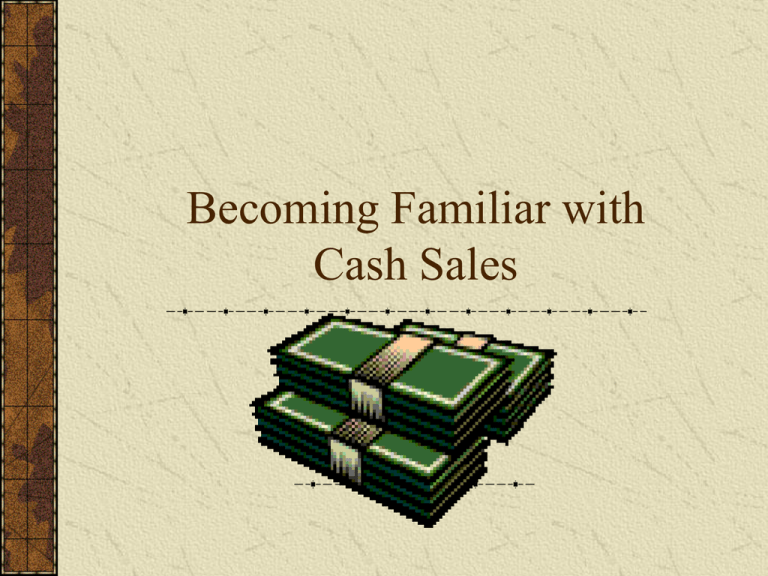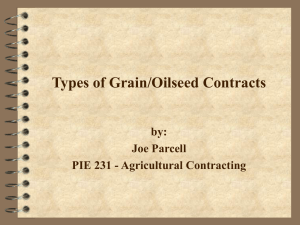Cash Sales Powerpoint
advertisement

Becoming Familiar with Cash Sales Becoming Familiar with Cash Sales Objectives: Understand advantages and disadvantages of various types of cash sales Identify the various cash contracting methods Understand various methods of electronic marketing Objective #1 Understanding advantages and disadvantages of cash sales Cash Sales Defined: as a seller delivers the commodity to a buyer and takes an immediate CASH payment. The commodity must be physically in existence at the time of the transfer May be made at harvest or later from storage in crops or at weaning, yearling, etc. for livestock Advantages of Cash Sales Easy Cash Flow No Storage Necessary Local Market Disadvantages of Cash Sales Risky Price/Basis Usually Weak Market Congestion Formula Price (Cost-Plus) Contract Designed to help guarantee the producer a selling price above the production costs Costs of input plus a fixed dollar amount added by buyer equals the minimum price. Objective #2 Identify the various cash contracting methods Cash Forward Contracts Defined: Cash market price is established for later delivery of a specific quantity and quality of a commodity between the buyer (an elevator, packer, processor, or exporter) and a seller (a producer or elevator) The contract price is tied directly to the price being discovered in the futures markets When the producers signs a forward contract, his exposure to price risk has been transferred to someone else who is trading in the futures complex Advantages of Cash Forward Contracts Advantages Easy Negotiable/written No market risk Local market Disadvantages of Cash Forward Contracts Not Flexible Production risk/penalty Cannot take advantages of prices increasing after contract is made Deferred Pricing Contract Defined Is when a seller delivers the commodity to the buyer at some point in time but maintains control of when it is priced. The contract allows a producer to take advantage of a rise in price an not pay carrying cost. Another type of deferred price contract is the basis contract The seller can fix the cash – futures differential or basis Deferred Pricing Contract The price is not fixed just the basis Should only be considered only when the local basis is usually favorable Any narrowing of the cash-futures differential is foregone Deferred Payment Contract Delivery and pricing may take place in, say, the fall, but payment is not received until after the new tax year has begun. Title to the commodity goes to the buyer upon delivery Recognized mean of tax planning Minimum Price Contracts Promoted as cash contracts but are actually hedges in the options market The buyer purchases put options equal to the quantity specified in the minimum price contract and holds the position until the cash commodity is delivered. One advantage of using a minimum price contract over a short option hedge is that the elevator or packer handles all of the trading. Hedge To Arrive Sellers indirect use of the futures market to capture what is considered to be an acceptable price for a commodity Two Conditions The price expected to fall The local basis is expected to rise The basis is variable through out the contract. Selling Livestock Two ways Live Weight Group marketing – All animals are in a group Sorted or selected- the animals are segregated into groups based upon their grade Carcass Grade and Yield Based on actual trimmed wholesale cuts that a carcass produces Price Window Contract Sets upper and lower price limits that a seller can receive If the current price is between the two limits then the producer is paid the current price If the current price is above or below the two limits the seller and buyer split the difference between the current price and the appropriate limit Objective 4: Understand various methods of electronic marketing Electronic Auctions Three types of media Telephone Computer Video Telephone Auctions An authorized grader grades a lot of animals Written description of the lots including grade, location, number in lot. Conference call is set up the day of the auction between the buyers and auctioneer When bidding stops the lot is considered sold and bidding starts on the next lot. Usually 20 to 30 seconds of no bids is considered that the lot is sold. Computer Auctions Computer terminals give buyers direct access to the lot descriptions on the computer instead of paper Bids are keyed until no buyer wishes to bid more After about 20 to 30 seconds of no bids the lot is considered sold. Appealing to any producer that wants to set the minimum price for their lot because a computer will take and store bids but will not consider the lot sold until the bids reach or exceed the minimum set price Video Auction Buyers can visually inspect the livestock Prior to the auction date a representative goes around and films the lots to be sold. Many times the seller will explain the terms of payment of delivery procedures on the tape as well. A catalog is also provided to each buyer Auction day the video is projected on a screen and bidding takes place by telephone Web Based Marketing The use of the internet to buy and sell products where the buyer can scan what sellers have and contact them if they see an attractive bid Used by most niche markets








